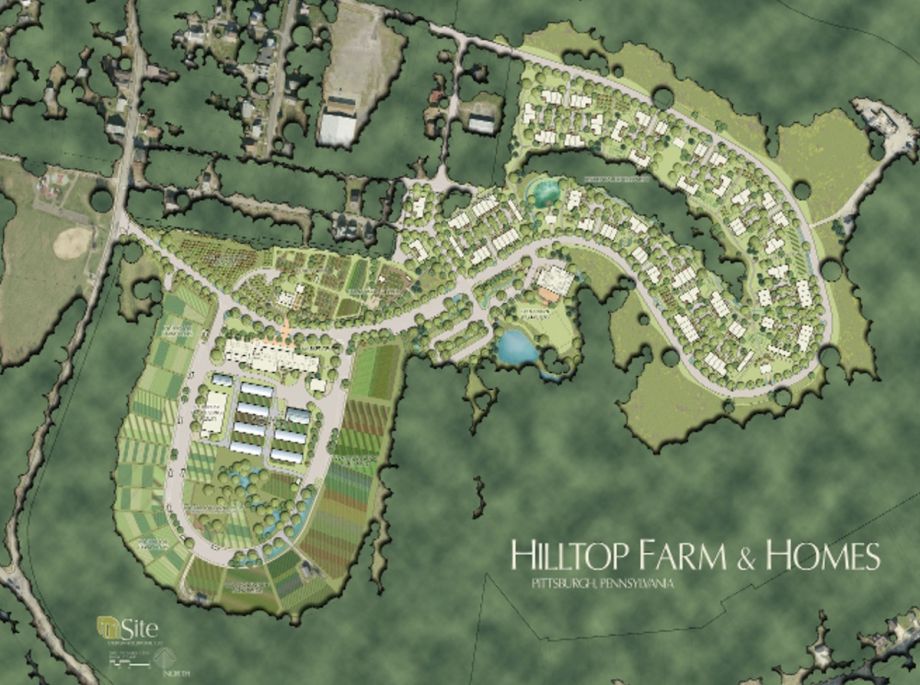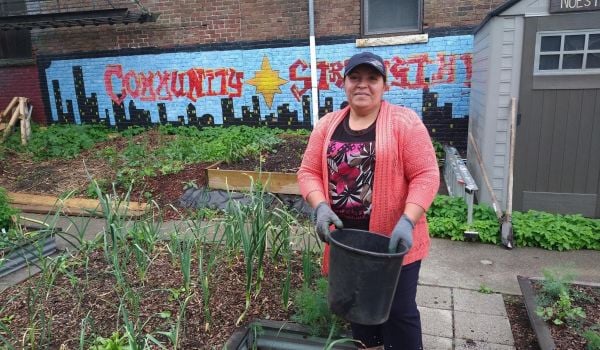At its peak, the St. Clair Village public housing complex was home to many hundreds of families living in the 680 townhome and apartment units. As was often the case with massive public housing projects in the 1950s, the Pittsburgh Housing Authority built the complex far outside the city core, on the south side of town. Over the decades, the number of residents dropped and the Housing Authority demolished vacant buildings. In 2009, it moved to shutter the rest of the complex, evicting the remaining residents and razing the site the following year.
Just two years later, the Hilltop Alliance, a nonprofit community advocacy group that works in 11 south Pittsburgh neighborhoods, began the long and arduous process of reinventing the now-vacant St. Clair Village site. Their vision: a 23-acre urban farm and a new affordable housing development. After five years of feasibility studies, planning, community meetings and complicated land deal negotiations, Hilltop Alliance held a ribbon cutting in late August to celebrate the start of soil rebuilding work.
“The agriculture will serve as a hub for the community and a driver for the housing in an otherwise distressed market. Right now the median property value in this area is under $30,000. A lot of this is about creating an anchor community asset that can start to spur more home buyer interest and reclamation of other vacant property in the area,” says Hilltop Alliance Executive Director Aaron Sukenik.
The site will have several components. Much of the land will be devoted to production farming. The produce will be sold through a CSA (community supported agriculture) program and at an on-site market. There will be small community farm plots, a community garden and youth farm education. Much of the rest of the farmable acreage will be devoted to a workforce development and entrepreneurship program for people who want to get into the agriculture business. The farm is partnering with Pennsylvania State University’s Penn State Center to run the career development component.
Eventually the farm will also include a barn for community events and weddings. Sukenik says the rentals will help generate revenue to support the programs.
Though Hilltop Alliance broke ground and started soil prep work, the federal Department of Housing and Urban Development owns the site and the Pittsburgh Housing Authority still manages it. Moving forward, ownership and management of the farm and housing will remain a complicated, many-party affair. One scenario: HUD transfers ownership to the city, the Housing Authority will sell the whole site to the Urban Redevelopment Authority of Pittsburgh, which will, in turn, divide the land into the farm plot and the housing plot. The Allegheny Land Trust will purchase the land and lease it to Hilltop Alliance for a symbolic $1. The Redevelopment Authority will maintain ownership of the housing side of the site. Together with the Housing Authority, it will put out an RFP to find a third party to build the new housing development.
Sukenik says there are many details to sort out, but the goal is to have strong ties between the farm and the residents in the housing development. One idea: CSA shares built into residents’ leases so they would get a box of fresh produce every week or two. Residents will also have access to community plots, youth programing and the events barn.
Hilltop Alliance still has a tough row to hoe to get everything up and running. “It’s hard to put a reliable timeline on our start date because we need to keep monitoring the rebuilding of the soil,” Sukenik explains. “That could take a year or two. We’re not going to invest people’s time and energy and talent in the ground before the site is ready for it.”
They also can’t build any physical infrastructure such as the barn and market until the land deals are settled. Sukenik says they’re hoping for a two- to five-year build-out of the full site. If the soil is ready, however, they could start farming as soon as next summer.
There’s also the matter of finding funding. The group has kicked off a capital campaign to raise the estimated $9.9 million necessary to build the farm. If successful, a new nonprofit entity will form to take the project out of Hilltop Alliance’s hands.

Josh Cohen is Crosscut’s city reporter covering Seattle government, politics and the issues that shape life in the city.
Follow Josh .(JavaScript must be enabled to view this email address)
















